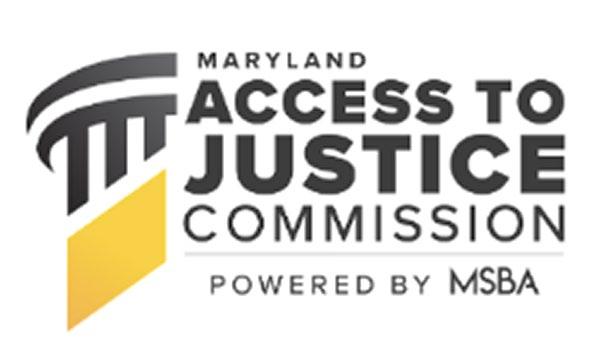





BY REENA SHAH, ESQ.
THE MARYLAND ACCESS TO JUSTICE COMMISSION (A2JC) remains a critical advocate for ensuring access to legal representation in eviction cases, with a focus on securing permanent funding for the Access to Counsel in Evictions (ACE) program. This program, established in 2021, provides income-eligible Marylanders with the right to legal representation during eviction proceedings. Since its inception, ACE has proven to reduce eviction rates, save the state money, and address inequities in the justice system.
Broad Engagement Across the Legal Community
A2JC has worked tirelessly to engage stakeholders and amplify its advocacy efforts. On January 13, the Public Interest Law Committee (PILC) hosted its 2nd Annual Legislative Preview, drawing over 85 attendees and representatives from 15 organizations, including the Office of the Public Defender, the Office of the Attorney General and numerous
civil legal aid groups. The event highlighted legislative priorities, such as increasing access to civil legal aid and strengthening tenant protections, but also covered a broad swath of legal issues that are harmful to vulnerable Marylanders, including tax sales, expungements, consumer debt, immigration and more. By coordinating advocacy and strategic communications efforts, A2JC and PILC aim to build momentum and ensure alignment on key legislative goals, including the permanent funding of ACE.
Legislative Priorities: Why Permanent Funding for ACE Is Critical
A cornerstone of A2JC’s legislative efforts is securing permanent funding for the ACE program, as the current funding from the state’s abandoned property fund is set to sunset in 2027. Without permanent funding, the program’s success and long-term sustainability are at risk.
The program’s funding challenges stem from the high volume of eviction cases in Maryland, with over 400,000 cases filed annually—one of the highest rates in the country. While the program is currently supported by $14 million annually from the abandoned property fund until 2027, an additional $6–10 million per year is required to meet the full scope of needs statewide and there needs to be ongoing investment in the program for it to continue to keep Marylanders housed.
The importance of the ACE program is demonstrated by its success. In fiscal year 2024 alone, ACE attorneys closed over 9,100 cases, benefiting more than 21,000 Marylanders, including 9,100 children. The program proved to be 88% effective in preventing eviction or disruptive displacement for those tenants who wanted to
remain in their homes. A2JC
Executive Director Reena
Shah highlighted these points in her January 15 testimony before the Senate Budget and Taxation Committee in support of Senate Bill 154 (SB154), cross-filed with House Bill 103 (HB103). Sponsored by Senator Hettleman and Chair Guzzone, the bill seeks to lift the sunset provision on the program’s funding, ensuring consistent support for ACE’s continued implementation.
Shah emphasized that ACE has been particularly effective in addressing disparities, as Black women and single mothers are disproportionately affected by evictions.
She also discussed how investing in ACE in a tight budget year is the right thing to do because of how the program saves the state money. For every $1 spent on the program, the state receives almost $4 in return. In just the first year, the state saved over $45M dollars because of the ACE program. If the ACE program's funding is left to expire, not only will Marylanders will lose their homes, but the state will have to pay the heavy price tag of shelter costs, medical expenses and it will see declines in educational achievement and economic prosperity.
ACE Task Force: Addressing Implementation Challenges
In its fifth annual report, delivered in January 2025, the Access to Counsel in Evictions Task Force, chaired by Shah at the request of Attorney General Anthony Brown, outlined several key recommendations to strengthen the program’s implementation.
In fiscal year 2024 alone, ACE ATTORNEYS CLOSED OVER 9,100 cases
BENEFITING MORE THAN
21,000 Marylanders INCLUDING 9,100 children
The Task Force recommended that the Maryland General Assembly secure a permanent funding source for the ACE program by lifting the sunset on the $14 million annually provided through the state’s abandoned property fund. While this funding is critical, it is not sufficient to meet the program’s projected annual costs of $20–24 million. The Task Force also urged the legislature to provide supplemental funding to close this gap, ensuring that all income-eligible tenants across Maryland can access the representation they need.
Standardizing Implementation Across Courts
The Task Force emphasized the importance of consistent implementation of the ACE law in courts statewide. Currently, tenants' experiences under the ACE program can vary depending on their location,



As A2JC continues its advocacy for permanent funding, the stakes are clear: without a stable financial foundation, the ACE program’s ability to deliver equitable outcomes and reduce evictions across Maryland could be compromised.
Many eligible tenants remain unaware of the program until they are in court, which limits their ability to prepare a defense or seek assistance in advance. The Task Force recommended clearer language on eviction notices that are sent from courts, administrative agencies and landlords, tenant outreach campaigns, and partnerships with community organizations to increase awareness and utilization of the program.
Improving Attorney Recruitment and Retention
with some courts adopting more streamlined processes than others. The Task Force called for greater standardization in court procedures and forms, including the use of uniform language to notify tenants of their right to access counsel, an introductory video explaining the ACE program and a bench card for judges to name a few. These steps are vital to ensuring equitable access to legal representation for all tenants, regardless of where they live in Maryland.
Awareness Through Communication
The Task Force identified the need for a coordinated communications strategy to inform tenants of their rights under the ACE law and how to access legal representation.
Staffing remains a significant challenge for the ACE program, particularly in rural areas. The Task Force called for competitive salaries and professional development opportunities to attract and retain skilled attorneys. It also highlighted the importance of expanding legal education initiatives, such as housing justice clinics at law schools and fellowships for new attorneys, to build a pipeline of future ACE lawyers.
Moving Forward
As A2JC continues its advocacy for permanent funding, the stakes are clear: without a stable financial foundation, the ACE program’s ability to deliver equitable outcomes and reduce evictions across Maryland could be compromised. With support from key stakeholders, including the Maryland Legal Services Corporation, civil legal aid organizations, and the Office of the Attorney General, A2JC is committed to ensuring that ACE remains a cornerstone of Maryland’s access to justice initiatives.
Since its inception in 2008, the Women Moving Forward (WMF) Re-entry Conference has been held in partnership with the Maryland Correctional Institution for Women (MCIW). The conference was initiated by the National Association of Women Judges (NAWJ), a leading organization dedicated to ensuring equal justice and access to the courts. in collaboration with other groups and individuals concerned about the welfare of incarcerated women.
The primary objective of this annual conference is to provide women who are within six to 18 months of release with resources and information to support their successful return to the community. Attendees engage in comprehensive workshops on a variety of topics such as housing, money, and credit management, obtaining employment, access to health care, educational opportunities, family reunification, and tips on successfully navigating parole and probation requirements. The conference also addresses challenges such as coping with trauma, substance abuse, and addressing mental health concerns.
The WMF seeks to provide participants with a true conference experience—including the provision of conference bags containing the conference program, a journal, and other assorted items such as a calendar, toiletries and other valuable items donated by our partners and sponsors. Keynote speakers and previously justice impacted women from MCIW share their experiences and inspire the attendees to plan for their own success.
In their post-conference evaluations, the women provide feedback on what they have learned:
“ “
Being a convict doesn't mean I can't be a successful person.
“
How to address incarceration when interviewing.
“
We are not alone after release.
Even though I am a convicted felon, my life does not end here.
“ The
How to take advantage of resources.
“
importance of advocating for yourself.
By addressing the multifaceted needs of participants, the WMF Re-entry Conference fosters a pathway to empowerment and reintegration, reflecting a steadfast commitment to transforming lives and building stronger communities. For more information about the conference, please go to www.wmfmd.org.